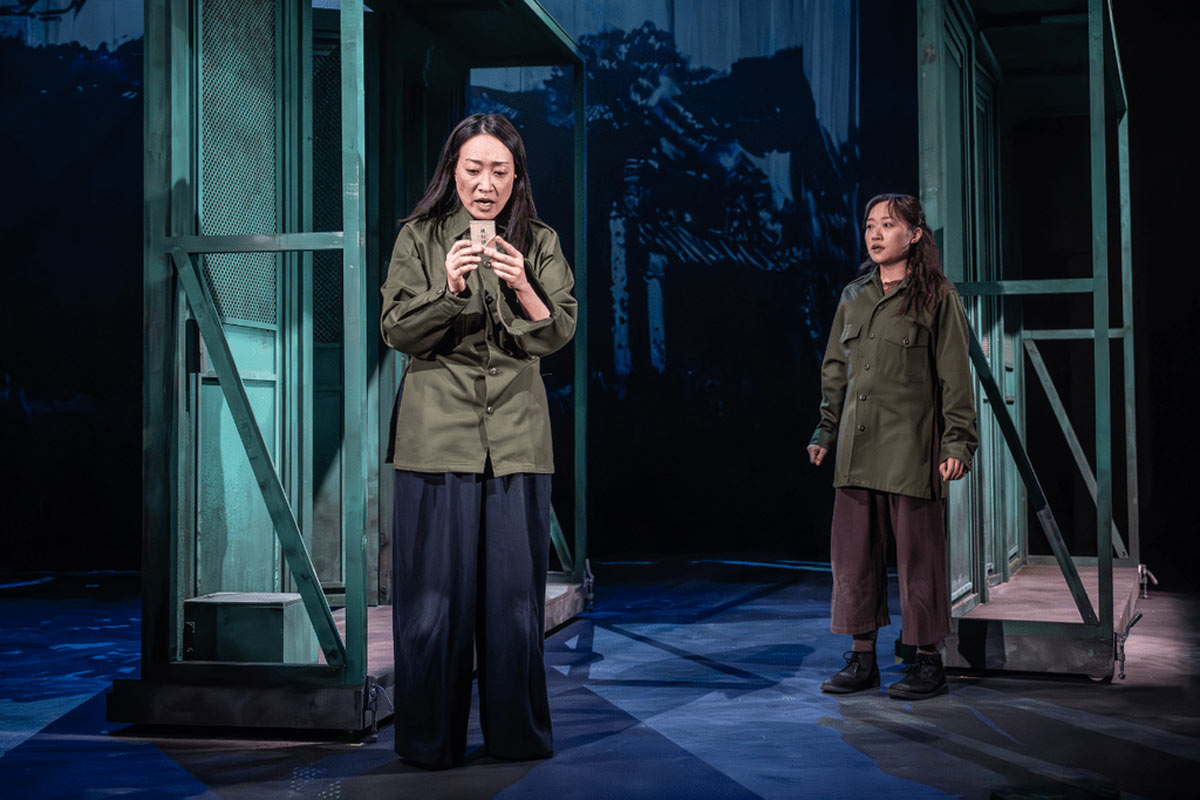Following huge criticism and accusations of censorship, Featherstone showed her true leadership skills and revoked her decision, and rightly so, for whilst Rita Sue and Bob Too is a hard and uncomfortable watch, it’s also a necessary one.
I wish I could travel in time to be able to see the original production of Dunbar’s play. Set in ‘Thatcherian’ Bradford, RITA, SUE AND BOB TOO examines the relationship between two schoolgirls Rita and Sue and a married 27 year old Bob. When the script was adapted into a film in 1987, the playwright was frustrated with the way that many viewed the story as a comedy.
Watching Dunbar’s story on the stage of Royal Court nearly 30 years after her premature death, I couldn’t help but notice that whilst Dunbar’s writing is ageless, despite it being deeply rooted in the socio-economic politics of its time, our understanding of its context has evolved. The dark humour that is ever present in the way Dunbar narrates the story allows us to really connect with its characters, and does not fill the auditorium with laughter but gives us space to breathe the harrowing and often uncomfortable reality of the world the Bradford born playwright describes so well.
Much of this is to the credit of Kate Wasserberg. The newly appointed Artistic Director of Out of Joint directs this revival with a deep understanding of the complexity of its themes and their relevance in the #MeToo world. Rita and Sue are not only the victims of the society they live in, where their dreams and aspirations are quashed by the political climate, but unfortunately their future is also determined by the patriarchal rules they must obey. Both Gemma Dobson (Sue) and Taj Atwal (Rita) deliver powerful performances; their relationship is portrayed in a truthful and compelling way, proving a difficult watch; when the two girls begin to loose each other amidst a situation they have been coerced into by an older and married man. James Atherton’s portrayal of Bob is nothing if not layered; he is a broken man, an example of toxic masculinity, as he looks for validation from everyone around him. There are no excuses for his behaviour in this revival and no directions that would allow for him to be redeemed in any way. Dunbar’s writing is never one dimensional and neither are her characters.
Samantha Robinson as Michelle, Bob’s wife, is simply spectacular. Perhaps one of the most touching moments is when we see three generations of Bradford women, Sue, Michelle and Sue’s Mum (Sally Bankes) revolt against patriarchal oppression and self-serving politicians. In the end it is the bleakness and hopelessness that wins out, nevertheless it is the women that remain the heroes in this story.
You can’t talk about this production of RITA, SUE AND BOB TOO without mentioning Max Stafford Clark, who originally was the co-director of the production. Three days into the rehearsals, the founder of Out of Joint left the rehearsal room and the company, amid allegations of sexual misconduct. One of the reasons why I would like to travel back in time is to see the differences in Stafford-Clarke’s directions in 1982 and those of Wasserberg.
Perhaps after all this time, Dunbar’s astonishing voice has finally got what it deserved: untarnished and empathetic direction that strives to show us the difference between now and then.

 Octagon Theatre Bolton and an Out of Joint co-production of Andrea Dunbar’s RITA, SUE AND BOB TOO endured a shaky road to the stage of The Royal Court. The Artistic Director of the theatre, Vicky Featherstone decided that in the light of recent events regarding sexual harassment in the industry this revival of Dunbar’s debut should not be part of The Royal Court season.
Octagon Theatre Bolton and an Out of Joint co-production of Andrea Dunbar’s RITA, SUE AND BOB TOO endured a shaky road to the stage of The Royal Court. The Artistic Director of the theatre, Vicky Featherstone decided that in the light of recent events regarding sexual harassment in the industry this revival of Dunbar’s debut should not be part of The Royal Court season.


 Following its massive success last year, Peter Shaffer’s legendary AMADEUS returns to the Olivier’s Stage at The National Theatre. Whether you are a fan of Miloš Forman’s film adaptation of Shaffer’s play, or you’ve never heard of the play before, you will not be disappointed by Michael Longhurst’s visually striking story of jealousy, genius and music.
Following its massive success last year, Peter Shaffer’s legendary AMADEUS returns to the Olivier’s Stage at The National Theatre. Whether you are a fan of Miloš Forman’s film adaptation of Shaffer’s play, or you’ve never heard of the play before, you will not be disappointed by Michael Longhurst’s visually striking story of jealousy, genius and music.